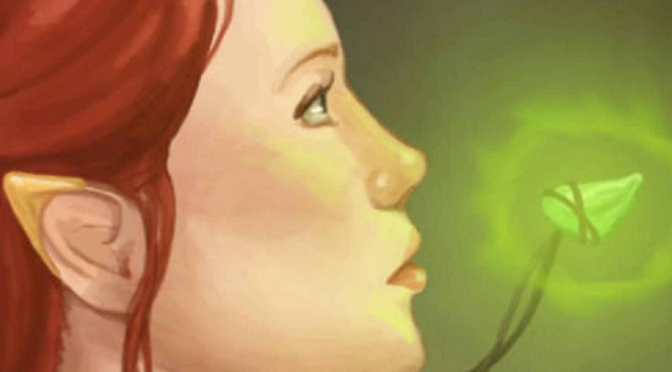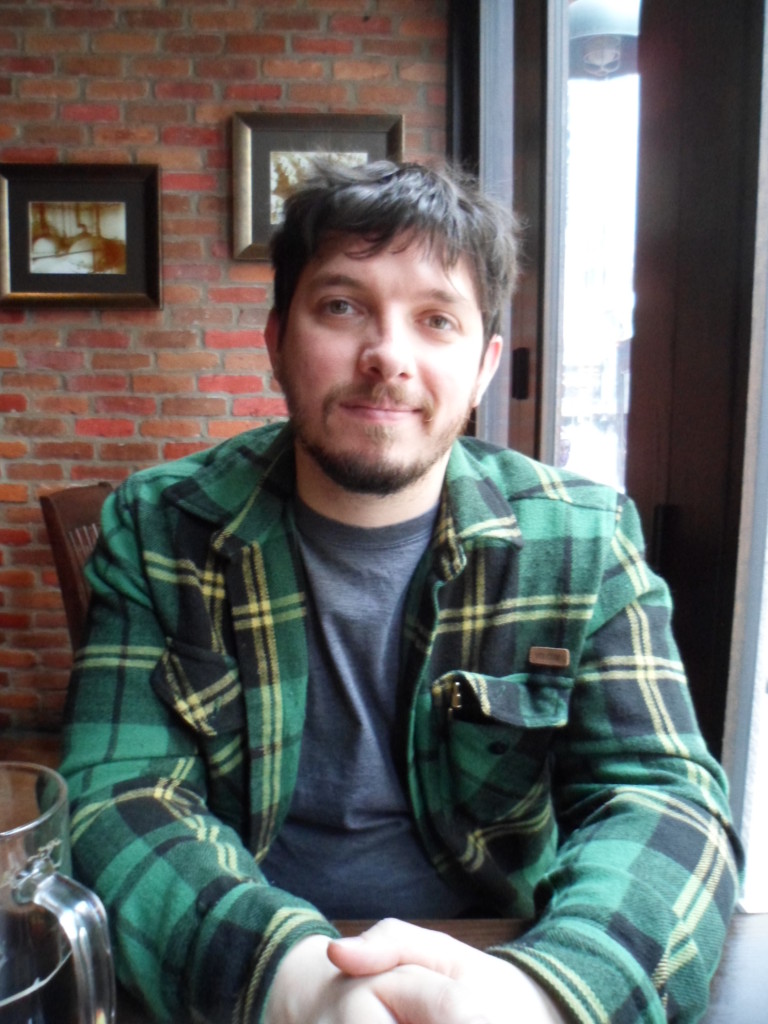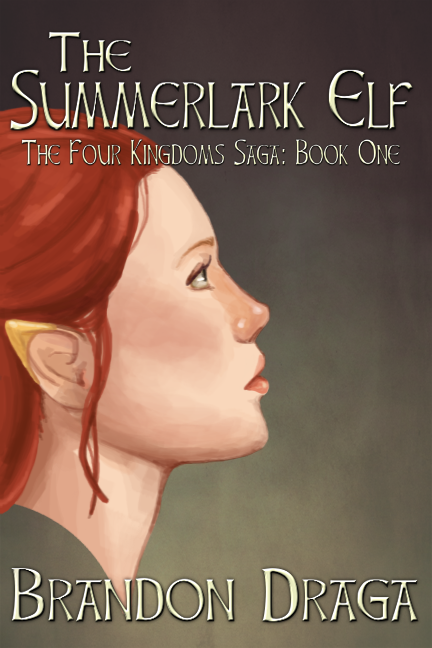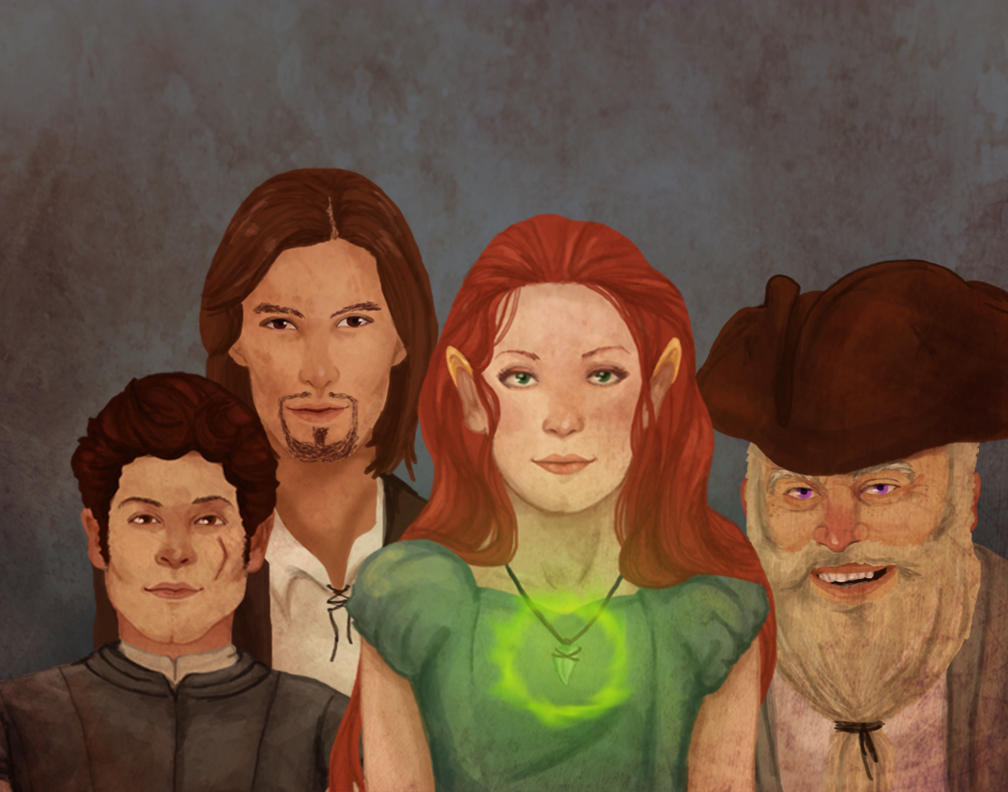We decided to spend some extra time in Otherworld this go around, and we were very lucky to follow one awesome author with another one.
Brandon Draga is the author of The Summerlark Elf, the first novel in his Four Kingdoms series. I could not pass up a chance to interview him, and we had an interesting conversation that I really enjoyed. Check out it out below, and then go read Brandon’s book!
Tellest: Your world, while clearly its own, has a very familiar setting, almost like it pulls inspiration from Wizard of the Coast novels. Was this intentional?
Brandon Draga: I don’t know that it was intentional so much as it was inevitable. So much of my exposure to the fantasy genre stems from Dungeons and Dragons. The first fantasy novels I ever read weren’t Tolkien, they were The Crystal Shard and The Last Thane. The world itself was very much conceived from my home D&D game. I did have to watch myself, though, and make sure I wasn’t cribbing too heavily from other works, and I think the distinctions will be a bit clearer as the world opens up a bit in the next book.
T: Speaking of inspirations, there seem to be others scattered about here and there, as well. It feels like you know your fans. There’s a specific scene that seems like it may have taken place a long time ago, in a galaxy far, far away…
BD: I think part of what’s both wonderful and frustrating about writing any kind of speculative fiction in this day and age is the wealth of past content to draw on for inspiration. Things like Star Wars, and Lord of the Rings are so ingrained in the cultural psyche that they’re almost inescapable. When someone talks about “The Hero’s Journey” now, they aren’t referring to Theseus or Jason, they’re referring to Luke Skywalker and Frodo Baggins. To be honest, it took me a minute to think of what scene you were referring to in the book, because it wasn’t intentional, but again Star Wars is so indelible that one can’t help but find comparisons.
T: There are a variety of races that we see in The Summerlark Elf. How did you find the best way to give them all a unique sense of self?
BD: The nice thing about the first book is that the events within it are relatively small in scope, so I didn’t have to worry about too many of the more nuanced bits of racial world building that I’ve since put more thought into. I’m a big fan of what one might classify as “classic” fantasy races, which is great in that it offers a great framework that I could then build upon to make those races relevant within my world. As with the world itself, I think those distinctions will become more evident as the series continues.
T: Speaking of which, do you have anything you can tell us about any follow-ups that may be on the way?
BD: Absolutely. As of this interview, I’m roughly 40,000 words into the second book in the series. Ideally, I’m shooting for a mid-November release date, to coincide with my appearance at Toronto’s SFContario. I don’t know how much I can talk about while still remaining spoiler-free, but I will go as far as to say that the world of the Four Kingdoms opens up substantially in this book, and there are probably as many questions answered as there are new ones raised.
T: One of your central characters is a bard, which you don’t see too often highlighted in literature. And certainly not the way you’ve introduced him. What influenced the decision to have this bard as one of your characters?
BD: The story of Erasmus is kind of a funny one, and speaks to just how much of an influence D&D was on this book. When I first started getting it into my head that I wanted to start playing D&D regularly, I rolled up a half-elf bard character named Erasmus, largely because I like half-elves, and I always pictured bards less as the stereotypical happy-go-lucky troubadours that gaming tables disdain and more as fast-talking grifters who’ve mastered the art of literally singing for their supper. As luck would have it, that character sheet ended up collecting dust for months, as I ended up taking on the responsibility of being full-time DM for my gaming group.
I did end up using Erasmus once, during a one-off session of the D&D Encounters organized play program that WotC runs weekly in game shops. My girlfriend and I attended, and she opted to play a halfling rogue, the younger brother of the wizard she played in my home game. On that fateful night, Erasmus Stonehand met O’doc Overhill, and I loved their chemistry so much that when I sat down to write The Summerlark Elf, I knew they would feature prominently.
T: Because you dance the line between tabletop and written word, do you think you’ll ever see the overlap in the other direction? Will Erasmus and O’doc rejoin D&D with the knowledge of the adventures they’ve been on in The Summerlark Elf?
BD: I actually did have them appear in my home game once, as NPCs, though this was before I’d started work on The Summerlark Elf. To be honest, if I had the time and the means, I’d probably wind up writing a whole Four Kingdoms campaign setting for the 4th Edition rule set, maybe set after the events of the books.
T: Do your players ever lead you down a path where you know you’ll use their story, dialogue or interactions in your work?
BD: I don’t know that I pull directly from my players’ actions, but they have definitely helped shape some aspects of the world. In the acknowledgments for The Summerlark Elf, I call Deanna “The true matriarch of the Overhill clan”, and that’s no lie. She and I once spent a couple hours mapping out the Overhill family tree, just so her wizard Odonwa could have a more fleshed-out backstory.
T: You personally made the beautiful cover illustration for The Summerlark Elf. Did you find it somewhat liberating not having to put your work in the hands of someone else in order to get an appealing cover out to audiences?
BD: As much as I wish I had the talent to create something as good as that cover, I’m actually no artist, and the cover and interior map were both done by my awesome and talented girlfriend Deanna Laver. Admittedly it was liberating not having to seek out an artist, and I had every confidence that she’d do a fantastic job, so as much as it was in someone else’s hands, I knew they were good hands to use.
T: Gah! My first interview snafu! And I always pride myself on going the extra mile for these. I guess I’m not as familiar with Tumblr as I thought I was. Oh well, it had to happen eventually. And it broaches some other topics we can talk about. My fiancée was instrumental in my third book’s cover, and I know I’d sing her praises to the high heavens at every opportunity. Why don’t you take this chance to give Deanna a nice plug?
BD: Absolutely! Deanna’s been doing some great freelance work over the past eighteen months or so, mostly doing illustration work for Jason Anarchy, the game designer behind Drinking Quest, which is, if I’m quoting him correctly “A stripped-down Dungeons and Dragons with drinking mechanics and Weird Al style parody.” Jason recently announced a full-colour remastered edition of the three DQ games via a very successful Kickstarter campaign, and Deanna’s work is featured fairly prominently.
Currently, Deanna and I are actually working on a children’s picture book called Dragon in the Doghouse, which we hope to release by the end of the summer. It’s akin to If You Give a Mouse a Cookie, but with kobolds and owlbears. I’m really looking forward to getting that one out to a lot of the parents I know. All of Deanna’s stuff can be found on her tumblr (deaillustrations.tumblr.com), and she can be found on twitter as @deannalaver.
T: You’ve got your pencil to a few different projects. Can we expect to see any other work outside of Dragon in the Doghouse and the Four Kingdoms books?
BD: The reality of the situation right now is that, much to my chagrin, writing isn’t paying the bills. I work a full-time job that, while it supports my writing, certainly doesn’t leave me enough time as I’d like to write. I do have other projects that I’ve dabbled with; a couple more children’s book ideas, my own tabletop game, things that don’t require the same level of commitment as writing a novel, but until I have some more time on my hands, just about all of my energy is going into the Four Kingdoms books.
T: You’re a fairly well rounded artist (leaving this in here for posterity – d’oh!). You write and you illustrate. Did you also compose the ballads that are featured in The Summerlark Elf?
BD: Again, I can’t really take credit for any illustrative talents past the rough-hewn scribble of a world map that Deanna wound up turning into something fantastic. The ballads, however, were my doing. Music is one of my great loves, which I think is something that definitely comes out in Erasmus (I have three guitars named Sheena, Daisy, and Selena). Maybe one day I’ll learn mandolin and put the songs to music.
T: You’re a man of many passions. Skating. Gaming, both tabletop and on consoles. History. Music. We already know that a lot of this lends itself your writing. Do you have any other interesting anecdotes or stories that relate to your life?
BD: I definitely have more interests than time, that’s for sure. I know it seems like the odd duck of the bunch, but skateboarding has actually been just as big a part of my writing as everything else. For about a year, I regularly kept a blog called Between Two Junkyards: Thoughts South of Guadaloupe. It was really a product of my breaking my ankle when I was 25, and needing some kind of conduit for the creative energy I had. I’d like to think it was moderately successful: I managed to interview and gain the attention of a few pro skaters with the blog, and I think my writing really grew over the period that I updated it regularly.
T: You have a lot of fantasy influences for your work. Those elements have clearly shaped some of your words and story. But you also seem to have some inspiration from science fiction as well. Do you think we’ll ever see that lead into something a little more futuristic from you? Any plans to deviate from your comfort zone?
BD: I’m certainly not opposed to giving sci-fi a shot, but I don’t know that my initial attempts would amount to much. I’m the kind of person that, while I’m not a total Luddite, I don’t have a particularly vast understanding of science and technology, at least not enough to write a piece of sci-fi that was believable. I think speculative fiction has reached a point where you can’t get away with Star Trek explanations anymore. Reversing the positronic flow of the main warp core reactor as a deus ex machina just doesn’t fly with people these days.
Once again, I want to express my gratitude to Brandon for his time. He was a very gracious participant in this interview. Don’t forget to check out The Summerlark Elf! It’s a really good novel that is worthy of your attention.
If you’re the creator of fantasy worlds and you would like to be interviewed for your work, contact us via the link in the menu bar.
Michael DeAngelo
Latest posts by Michael DeAngelo (see all)
- Fantasy Promo – Quinine - July 25, 2024
- Sigil Art – Grim’s Hold - July 24, 2024
- Fantasy Promo – Light the Shadows (Under Elfhame’s Stars) - July 24, 2024



